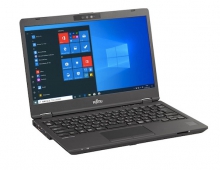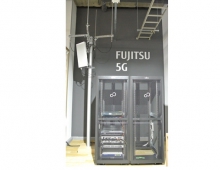
Fujitsu Now Shipping USB 3.0-SATA Bridge IC for PC Peripherals Supporting SuperSpeed USB 3.0
Fujitsu is now shipping its first generation USB 3.0-Serial ATA (SATA) bridge IC, built with Fujitsus own physical layer device (PHY).
The new MB86C30A supports the ultra-fast 5Gbps maximum data-transfer rate of USB 3.0, and incorporates an encryption/decryption engine. Samples are being built using Fujitsus 65-nanometer low-power process technology, and are available now.
Compared with USB 2.0 connections, the MB86C30A bridge IC provides an order of magnitude increase in data transfer rates from external storage devices such as hard disk drives to PCs. The new bridge IC incorporates on a single chip the USB communication control circuits, SATA communication control circuits, and protocol control and command control circuits. These circuits are required to construct an external USB storage device and to realize 5Gbps data transfer to a host PC.
The MB86C30A IC also contains an embedded Advanced Encryption Standard (AES engine to protect confidential data from being stolen, unintentionally leaked or lost, and to protect data following the disposal of storage devices. Hardware encryption does not burden the CPU of the host PC, and provides optimal protection for data. The encryption/decryption engine enables data to be easily encrypted for secure storage in external devices such as hard disk drives without impairing the performance of USB 3.0.
Features Full USB 3.0 Performance with Encryption Capabilities
The USB 2.0 interface, which is used widely in external hard drives and memory sticks, has had a maximum data transfer rate of 480Mbps. To provide faster speeds for reading and writing high volumes of data the USB 3.0 specification was ratified in November 2008. USB 3.0 supplies as much as 10 times the data transfer rate of USB 2.0, along with improved protocol efficiency and power management techniques. The maximum transfer rate of 5Gbps of USB 3.0 allows 10 to 30 GBytes of video data to be copied to a 3.5-inch hard disk drive in one-third to one-fourth the time USB 2.0 needs.
The MB86C30A bridge IC supports two AES operation modes: Cipher Block Chaining (CBC), a mode for encrypting block data, and XTS, the XEX encryption mode with tweak and ciphertext stealing. Both modes are ideal for hard disks in terms of security, strength and speed of encryption/decryption. Three key lengths are supported 128bit, 192bit and 256bit. High-speed encryption and decryption processing at a maximum of 300 MByte/sec. provides throughput without impairing the performance of USB 3.0.
Samples of the MB86C30A manufactured in 65nm CMOS process technology are available now in LQFP 64-pin 7mm x 7mm (0.4mm pitch) packages.
Compared with USB 2.0 connections, the MB86C30A bridge IC provides an order of magnitude increase in data transfer rates from external storage devices such as hard disk drives to PCs. The new bridge IC incorporates on a single chip the USB communication control circuits, SATA communication control circuits, and protocol control and command control circuits. These circuits are required to construct an external USB storage device and to realize 5Gbps data transfer to a host PC.
The MB86C30A IC also contains an embedded Advanced Encryption Standard (AES engine to protect confidential data from being stolen, unintentionally leaked or lost, and to protect data following the disposal of storage devices. Hardware encryption does not burden the CPU of the host PC, and provides optimal protection for data. The encryption/decryption engine enables data to be easily encrypted for secure storage in external devices such as hard disk drives without impairing the performance of USB 3.0.
Features Full USB 3.0 Performance with Encryption Capabilities
The USB 2.0 interface, which is used widely in external hard drives and memory sticks, has had a maximum data transfer rate of 480Mbps. To provide faster speeds for reading and writing high volumes of data the USB 3.0 specification was ratified in November 2008. USB 3.0 supplies as much as 10 times the data transfer rate of USB 2.0, along with improved protocol efficiency and power management techniques. The maximum transfer rate of 5Gbps of USB 3.0 allows 10 to 30 GBytes of video data to be copied to a 3.5-inch hard disk drive in one-third to one-fourth the time USB 2.0 needs.
The MB86C30A bridge IC supports two AES operation modes: Cipher Block Chaining (CBC), a mode for encrypting block data, and XTS, the XEX encryption mode with tweak and ciphertext stealing. Both modes are ideal for hard disks in terms of security, strength and speed of encryption/decryption. Three key lengths are supported 128bit, 192bit and 256bit. High-speed encryption and decryption processing at a maximum of 300 MByte/sec. provides throughput without impairing the performance of USB 3.0.
Samples of the MB86C30A manufactured in 65nm CMOS process technology are available now in LQFP 64-pin 7mm x 7mm (0.4mm pitch) packages.





















